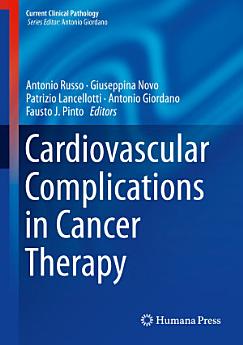Cardiovascular Complications in Cancer Therapy
Antonio Russo · Giuseppina Novo · Patrizio Lancellotti · Antonio Giordano · Fausto J. Pinto
oct 2018 · Springer
eBook
224
Páginas
reportLas valoraciones y las reseñas no se verifican. Más información
Información sobre este eBook
This proposed text is designed to provide a useful and comprehensive resource and state-of-the-art overview to readers about vascular damage potentially induced by antineoplastic drugs. Thanks to more and more effective antineoplastic treatments the survival of cancer patients is enormously increasing, but at the same time it is increasing the burden of related cardiovascular complications that affect morbidity and mortality. On this basis a new branch of cardiology has been developed, that is Cardio-Oncology. The aim is to prevent cardiovascular complications related to cancer therapy and to facilitate and avoid interruption of antineoplastic drugs due to the occurrence of cardiovascular damage. An increasing attention has been given to cardiac damage, while, until today, vascular complications have been poorly evaluated. The aim of this book is to focus on vascular complications related to cancer treatment, to guide the clinician at facing, during his every day practice, cardiovascular toxicity in cancer and hematologic patients. The proposed sections of the book have been structured to review the molecular mechanisms underlying vascular damage induced by new and old treatments, to describe the various manifestations of vascular disease that may range from artery to venous disease (including coronary artery disease, peripheral arterial disease, venous thromboembolism and pulmonary hypertension), and to provide advice to monitor patients undergoing onco-hematologic treatments in order to prevent and eventually manage vascular damage.This book will address resident and fellow physicians, medical oncologists, cardiologists, general practitioners and all those who take care of these patients.All invited authors will be recognized experts in their field, and leading international researchers on these topics. The editor has worked with these expert colleagues on a variety of other projects. The authors will provide their manuscript according to current literature and clinical research studies. The book does not seek to duplicate or replace other current resources. Rather, it will create a comprehensive yet concise resource on this emerging topic that is not adequately covered by any current literature.
Acerca del autor
Antonio Russo, MD, PhD
Full Professor of Medical Oncology
Department of Surgical, Oncological and Oral Sciences (Di.Chir.On.S.)
University of Palermo, Italy
Director of Medical Oncology Section, University Hospital P. Giaccone
Palermo, Italy
Giuseppina Novo, MD, PhD
Associate Professor of Cardiology
Biomedic Department of Internal Medicine and Specialities (DIBIMIS) University of Palermo, Italy
Division of Cardiology, University Hospital P. Giaccone
Palermo, Italy
Patrizio Lancellotti, MD, PhD
University of Liège Hospital, GIGA Cardiovascular Sciences
Department of Cardiology
CHU Sart Tilman, Liège, Belgium
Gruppo Villa Maria Care and Research, Anthea Hospital
Bari, Italy
Antonio Giordano, MD PhD
Director, Sbarro Institute for Cancer Research and Molecular Medicine and Center of Biotechnology
College of Science and Technology
Temple University
PA 19122
USA
Fausto J. Pinto, MD, PhD, FESC, FACC, FSCAI, FASE
Professor, University Hospital Santa Maria, CHLN
University of Lisbon, Portugal
Dept. of Cardiology
Av Prof Egas Moniz
Lisboa 1649-028 Portugal
Full Professor of Medical Oncology
Department of Surgical, Oncological and Oral Sciences (Di.Chir.On.S.)
University of Palermo, Italy
Director of Medical Oncology Section, University Hospital P. Giaccone
Palermo, Italy
Giuseppina Novo, MD, PhD
Associate Professor of Cardiology
Biomedic Department of Internal Medicine and Specialities (DIBIMIS) University of Palermo, Italy
Division of Cardiology, University Hospital P. Giaccone
Palermo, Italy
Patrizio Lancellotti, MD, PhD
University of Liège Hospital, GIGA Cardiovascular Sciences
Department of Cardiology
CHU Sart Tilman, Liège, Belgium
Gruppo Villa Maria Care and Research, Anthea Hospital
Bari, Italy
Antonio Giordano, MD PhD
Director, Sbarro Institute for Cancer Research and Molecular Medicine and Center of Biotechnology
College of Science and Technology
Temple University
PA 19122
USA
Fausto J. Pinto, MD, PhD, FESC, FACC, FSCAI, FASE
Professor, University Hospital Santa Maria, CHLN
University of Lisbon, Portugal
Dept. of Cardiology
Av Prof Egas Moniz
Lisboa 1649-028 Portugal
Valorar este eBook
Danos tu opinión.
Información sobre cómo leer
Smartphones y tablets
Instala la aplicación Google Play Libros para Android y iPad/iPhone. Se sincroniza automáticamente con tu cuenta y te permite leer contenido online o sin conexión estés donde estés.
Ordenadores portátiles y de escritorio
Puedes usar el navegador web del ordenador para escuchar audiolibros que hayas comprado en Google Play.
eReaders y otros dispositivos
Para leer en dispositivos de tinta electrónica, como los lectores de libros electrónicos de Kobo, es necesario descargar un archivo y transferirlo al dispositivo. Sigue las instrucciones detalladas del Centro de Ayuda para transferir archivos a lectores de libros electrónicos compatibles.






